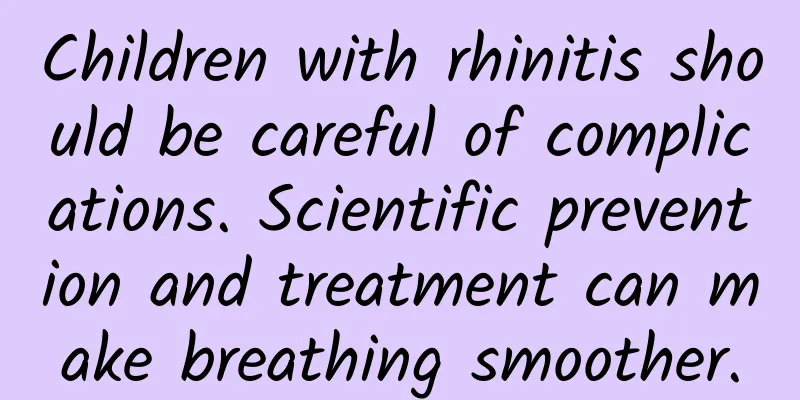Children with rhinitis should be careful of complications. Scientific prevention and treatment can make breathing smoother.

|
Flowers are in full bloom, and it is a good time for parents to take their children out for an outing. However, the increase in pollen in the air has made many teenagers with allergic rhinitis miserable. Allergic rhinitis is a common chronic nasal disease in the otolaryngology clinic. So, how to deal with allergic rhinitis in teenagers and make their breathing smoother? Recently, Chi Chenyu, deputy chief physician of the Department of Otolaryngology at Beijing University of Chinese Medicine Oriental Hospital, and Zhao Yawen, a practicing pharmacist at Laobaixing Pharmacy, answered these questions one by one. Improper control of allergic rhinitis can easily lead to a variety of complications If allergic rhinitis is not well controlled, there will be related complications. Chi Chenyu said that the most common complication of allergic rhinitis patients is the symptoms of allergic conjunctivitis in the eyes, itchy eyes, red eyes, and tears. In addition, if allergic rhinitis is not controlled for a long time, it may also induce allergies in the lower airways, that is, variant asthma and even other nasal lesions, such as chronic sinusitis and nasal polyps. Once severe sinusitis and nasal polyps occur, patients may need surgery to relieve the symptoms. According to Zhao Yawen, a licensed pharmacist at Laobaixing Pharmacy, the main characteristics of adolescent allergic rhinitis include the following: Typical symptoms: itchy nose, paroxysmal continuous sneezing, runny nose, stuffy nose, etc. These symptoms may seriously affect the study and life of teenagers. Risk of complications: If allergic rhinitis is not treated and controlled promptly and effectively, it may cause a series of complications, such as allergic conjunctivitis, variant asthma, chronic sinusitis, nasal polyps, etc. These complications will not only increase the difficulty of treatment, but may also cause long-term damage to the health of adolescents. Chi Chenyu reminded that allergic rhinitis in adolescents should be detected, treated and intervened early to avoid worsening of the disease and the occurrence of complications. Avoiding allergens in adolescents can reduce the incidence of allergic rhinitis According to Chi Chenyu, pollen is the most common substance that can cause allergies. Spring and autumn are pollen seasons, and the density of pollen in the air is high, which can easily induce allergic rhinitis. Teenagers have become one of the most susceptible groups to allergic rhinitis, mainly for the following reasons: Changes in the immune system: Adolescence is a period of gradual maturation and transformation of the immune system, which may make them more sensitive to allergens in the environment, thereby increasing the risk of allergic rhinitis. Changes in living habits and environment: During adolescence, children begin to go to school independently and participate in various activities. The environment and substances they are exposed to become more complex and diverse, such as new schools, new playmates, new foods, etc. These may contain new allergens and trigger allergic rhinitis. Genetic factors: Allergic rhinitis has a strong genetic tendency. If parents have allergic rhinitis, the risk of their children developing allergic rhinitis will also increase. Regarding the prevention of allergic rhinitis, Chi Chenyu reminded that one should avoid contact with allergens, such as pollen, animal hair, mites and fungi. If it cannot be completely avoided, one can strengthen the body and regulate the immune function through aerobic exercise and increased vitamin C intake. For patients with more severe symptoms, it is recommended to use preventive medications in advance, especially nasal sprays, to reduce or avoid the onset of symptoms throughout the allergy season. Chi Chenyu reminded that parents should also pay attention to the living environment and living habits of teenagers, and try to avoid contact with allergens to reduce the incidence of allergic rhinitis. Standardized use of medications for adolescent allergic rhinitis helps manage the disease According to the latest diagnosis and treatment guidelines for allergic rhinitis, the first-line treatment drugs for allergic rhinitis mainly include nasal corticosteroids, second-class oral and nasal antihistamines and some oral leukotriene receptor antagonists. Zhao Yawen said that for patients who are taking medication or have a history of allergic rhinitis, it is necessary to take preventive medication two to four weeks before an attack. In addition, avoiding contact with allergens is also crucial. For patients who buy medicines at pharmacies, he will remind them if they are clear about their allergens. If the patient does not know what their allergens are, the pharmacy recommends that they go to the hospital to seek help from a doctor to identify the allergens and better protect themselves. Zhao Yawen said that there are many common misunderstandings among patients who go to pharmacies to buy medicine. Generally speaking, patients tend to buy sodium chloride injection or saline for nasal irrigation. However, in the absence of other drugs for treatment, nasal irrigation can only play an auxiliary role in the treatment of allergic rhinitis, but it cannot achieve the therapeutic effect. In addition, many patients do not purchase and use medications according to the full course of treatment, and stop taking medications when there are no symptoms. In fact, if the medication is stopped or reduced prematurely, allergic symptoms may return. "Talking about stimulants is scary" is also a big misunderstanding of patients when purchasing and using medications, worrying that hormone drugs will affect blood sugar, blood pressure, blood lipids, and even the whole body. In fact, when nasal hormones work locally, only a small dose is absorbed by the whole body, so the effect on the whole body is minimal. Zhao Yawen said that as a powerful complement to medical institutions, retail pharmacies can provide patients with medication consultation and guidance, especially in terms of psychological and health knowledge education. Some retail pharmacies are also equipped with special chronic disease specialists to establish files and monitor chronic disease patients including allergic rhinitis to improve the quality of chronic disease management. |
<<: New healthy trend: Adults add some milk every day
>>: Mosquitoes awaken in spring and summer, beware of Japanese encephalitis
Recommend
Wilson Electronics: The growth of MMS text messaging among American teens – infographic
[The development of MMS among American teenagers]...
How to treat red and sticky vaginal discharge
The leucorrhea of a healthy person should be wh...
Why are there so many "asymptomatic infections"? What's the difference between asymptomatic infections and positive tests?
As the weather gets colder, the COVID-19 outbreak...
What are some ways for girls to exercise?
Girls are generally lazy. In our country, female ...
Recently! My body suddenly became itchy, red and swollen for no apparent reason. Read this article! (It’s not a mosquito)
Who in my family would understand? While waiting ...
Abdominal pain one week after abortion
Most women who have an unexpected pregnancy will ...
It’s the Spring Festival, don’t let back pain bother you
It’s the Spring Festival, don’t let back pain bot...
What to do if a girl has chest pain
Some girls will experience breast pain during the...
What to do if pregnant women have constipation in late pregnancy
In order to meet the needs of the body, people ha...
Why does my appetite decrease during the eighth month of pregnancy?
Women need to pay attention to many things during...
Recipe table for postpartum meals
Natural childbirth is the best way for women to g...
Can I still get pregnant if I have gynecological inflammation?
Gynecological inflammation is a demon that troubl...
Often feel dizzy and insomnia? These are the reasons
Insomnia is an increasingly common phenomenon in ...
The first day of menstruation, the blood is dark and the amount is small
On the first day of menstruation, the menstrual b...
Can pregnant women use fusidic acid cream?
Fusidic acid ointment is actually an antibiotic, ...









